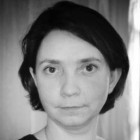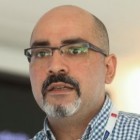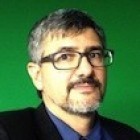Pre-Conference Workshop M3
For New Policymaking – A Knowledge Exchange on Open Education: in Search of Sustainable Models
Date Wednesday, 30 Nov Time – Room: Charlottenburg I Price: free of charge Status: fully booked
Workshop leaders

Perrine de Coëtlogon
Digital Expert for Higher Education, Europe & International, French Ministry for Higher Education, France
Perrine de Coëtlogon is an expert for Digital technology, Europe & International, within the MIssion for Pedagogy and Digital Technology (MIPNES) of the French Ministry for Higher Education. She is member of the working group of the European Commission “Digital skills and competences” since January 2016 and has been member of the team that lead to the French innovative portal www.sup-numerique.gouv.fr. She has practised for 6 years as general secretary for the Frenchspeaking Digital University for Health and Sport Sciences (UNF3S), having therefor knowledge and practice in OER, in France but also in French speaking countries (Senegal, Ivory Cost, #IDENEUF). She has studied law and German law in Paris Ouest Nanterre La Defense and the Potsdam University (Germany). Before going back to higher education in 2009, she practised law at the Paris Bar for 7 years in French, English and German.
Links

Sophie Touzé
Responsable Ingénierie Pédagogqiue & Elearning, Open Education Consortium, France
Sophie Touzé is Head Elearning of VetAgro Sup, Veterinarian and Agronomic Institute of Higher Education in France. Vetagro Sup is member of Université de Lyon. Born in 1761 by the king Louis XV, it is the first Veterinarian school in the world.
Expert on new technologies and Innovation for ministers from 1997, Sophie has over 15 years od experience advising teachers and governance on pedagogical scenarios integrating new technologies.
She received two awards on pedagogical innovation for her work in 2004, 2007 and the leardership Learning impact "best multimedia platform" in 2009.
Convinced on the power of knowledge to make the world a better place to live, she is engaged with MIT and OCWC on the movement of Open Education. Head project manager for Université de Lyon, member of the Europeen project OCW EU for mobility, she is writing a report "Etat de l'art" on Open Education in France for Unesco.
Links
http://learninglab.vetagro-sup.fr/http://www.opencourseware.eu/

Sotiris Makrygiannis
CEO & Founder, Eliademy, Finland
Sotiris launched one of the very first e-schools back in 1997 but failed to make a commercial success. After 12 years building Operating Systems at Nokia he moved and created Eliademy.com with a mission to democratize education with technology. He is passionate about books, travel, and technology. Father of 2 and inspired by the open source movement.
Links

Alek Tarkowski
Public Lead, Centrum Cyfrowe, Poland
Dr Alek Tarkowski (1977). Sociologist, copyright reform advocate and researcher of digital society. Director of Centrum Cyfrowe, a think-and-do-tank building a digital civic society in Poland. Public Lead of Creative Commons Poland, the Polish branch of the global organization promoting flexible copyright models, for which he also works as European Policy Fellow. Member of the Administrative Council of Communia, a European advocacy association supporting the digital public domain. Former member of the Polish Board of Digitisation and member of the Board of Strategic Advisors to the Prime Minister of Poland, responsible for issues related to the development of digital society. Co-author of the report "Poland 2030" and the Polish long-term growth strategy. International policy expert on open content licensing and copyright policies, open and digital education, ICT for culture and heritage. For over a decade involved in building a digital commons and public domain in Poland and abroad.
Links
http://creativecommons.pl/http://centrumcyfrowe.pl/

Thierry Koscielniak
EdTech Policy Officer, Université Paris Descartes, France
Thierry Koscielniak is Vice CIO and Executive Director of the EdTech & Digital Pedagogy Office (ICT for Education) ; Research Engineer at the Paris Descartes University in Paris, France (www.parisdescartes.fr).
As a member of the IT Strategic Steering Board of his university, he plays a role in strategic planning and policy development for information system, infrastructure and programs.
He is also member of the board of CSIESR (www.csiesr.eu), French association of IT professionals in higher education.
His department is in charge of the eLearning plateform Moodle, the e-portfolio management system Mahara and of the university social network based on Elgg.
Thierry completed his Ph.D. in Computational Chemistry at the Pierre et Marie Curie University.
Links
Content
Pursuant to Socratic maieutic principles, several influencers such as Sugata Mitra (https://www.ted.com/speakers/sugata_mitra) believe pupils should be given “only” pedagogical contents and psychological supports to learn at school.
However, despite some successful experiments for young pupils, the reality of most of Western countries young adults is to go to university and study in a more or less “traditional” way more or less “traditional” courses. They can trust mostly only their own motivation and support. However, with the development of OER (Open Educational Resources), including MOOCs, produced by public higher education institutions or private companies, professors and students are able to find top quality contents.
French Ministry for Higher Education has been supporting the development of OER for more than 10 years and reaches in 2016 a certain degree of maturity on the subject, with more than 30.000 pedagogical resources available through the innovative portal www.sup-numerique.gouv.fr.
Nevertheless, in Europe in particular, more and more voices speak for a sustainable model for open educational resources.
The actual presentation aims to propose the following: OER will be still accessible for everyone. But when indexed with LOM or MLR and therefore registered in a sort of “streaming platform”, a global fee will be proposed to any company interested in their commercial use. The payment would be possible in euros and bitcoin, based on the blockchain technology.
The session will propose to the participants to join the association of authors of digital pedagogical contents, open or not, dealing with the intellectual property rights of the authors but also of the producers, only when the contents are used for a commercial purpose.
Agenda
- Description of the existing and proposed sustainable models for the creation and use of Open Education Resources (one hour):
- French governmental Platform www.sup-numerique.gouv.fr and its extension to be a “streaming platform” to OER for commercial purpose, Perrine de Coëtlogon
- The need for sustainability, a problem for public institutions and private companies producing OER, Sotiris Makrygiannis
- The existing sustainable models in Europe, Alek Tarkowski
- Open Education Consortium’s Point of view, Sophie Touzé
- Co-design workshop for one to three sustainable models for OER (two hours)
Target audience
All public of OEB16, in particular the producers of Open Educational Resources
Prerequisite knowledge
Experienced
Outcomes
One picture of the existing sustainable models for OER and one to three R&D projects for a sustainable model for OER and their networks